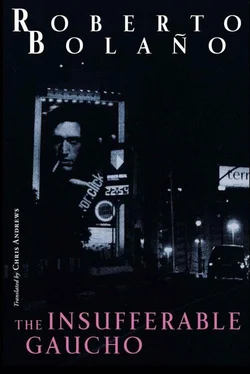By attaching Cela’s incredibly fat corpse to a horse, we could produce the new El Cid of Spanish letters, and we have!
Statement of principles:
In principle, I have nothing against clear, enjoyable writing. In practice, it depends.
It’s always a good idea to state this principle when venturing into the world of literature: a sort of Club Med cunningly disguised as a swamp, a desert, a working-class suburb, or a novel-as-mirror reflecting itself.
Here’s a rhetorical question that I’d like someone to answer for me: Why does Pérez Reverte or Vázquez Figueroa or any other bestselling author, for example Muñoz Molina or that young man who goes by the resonant name of De Prada, sell so much? Is it just because their books are enjoyable and easy to follow? Is it just because they tell stories that keep the reader in suspense? Won’t anyone give me an answer? Where is the man who will dare to answer? It’s all right, you can keep quiet. I hate to see people lose their friends. I’ll answer the question myself. The answer is no. It’s not just that. They sell and they are popular because their stories can be understood . That is, because the readers, who are never wrong — I don’t mean as readers, obviously, but as consumers, of books in this case — understand their novels or stories perfectly. This is something that the critic Conte knows, or perhaps, given his youth, intuits. It’s something that the novelist Marsé, who is old, has learned from experience. The public, the public, as García Lorca said to a hustler while they hid in an entrance hall, is never, never, never wrong. And why is the public never wrong? Because the public understands .
It is, of course, only reasonable to accept and indeed to demand that a novel should be clear and entertaining, since the novel, as an art form, is at best tenuously related to the great forces that shape public history and our private stories, namely science and television; nevertheless, when the rule of clarity and entertainment-value is extended to serious non-fiction and philosophy, the results can be catastrophic, at least at first glance, although the idea, the ideal, remains compelling, a goal to be desired and aspired to in the longer term. “Weak thought,” for example. Honestly, I have no idea what weak thought was or is supposed to be. Its promoter, I seem to remember, was a 20th-century Italian philosopher. I never read any of his books or any book about him. One reason — this is a fact, not an excuse — is that I had no money to buy books. So I must have learned of his existence in the pages of some newspaper. That’s how I discovered that there was such a thing as weak thought. The philosopher is probably still alive. But in the end he’s immaterial. Maybe I completely misunderstood what he meant by weak thought. Probably. But what matters is the title of his book. Just as when we talk about Don Quixote , what we’re usually referring to is not so much the book itself as the title and a couple of windmills. And when we talk about Kafka (may God forgive me), it’s less about Kafka and the fire than a lady or a gentleman at a window. (This is known as encapsulation, an image retained and metabolized by the body, fixed in historical memory, the solidification of chance and fate.) The strength of weak thought — this intuition came to me in a fit of dizziness, brought on by hunger — sprang from the way it presented itself as a philosophical method for people unfamiliar with philosophical systems. Weak thought for the weak classes. With a bit of well-targeted marketing, a construction worker in Gerona, who has never sat down on the scaffolding, thirty yards above street level, with his copy of the Tractatus logico-philosophicus , or reread it while chewing through his chope roll, might be prompted to read the Italian philosopher instead or one of his disciples, whose clear, enjoyable, intelligible style is bound to go straight to his heart.
At that moment, in spite of the dizziness, I felt like Nietzsche when he had his Eternal Return epiphany. An inexorable succession of nanoseconds, each one blessed by eternity.
What is chope ? What does a chope roll consist of? Is the bread rubbed with tomato and a few drops of olive oil, or is it just plain bread that is wrapped in aluminum foil, also known by its brand name as albal ? And what does the chope consist of? Mortadella cheese, maybe? Or a mixture of mortadella and boiled ham? Or salami and mortadella? Does it contain chorizo or sausage? And how did the foil come to have the brand name albal ? Is it a family name, the name of Mr. Nemesio Albal? Or is it an allusion to el alba , the dawn, the bright dawn of lovers and workers who, before setting off for their daily labor, put a pound of bread and the corresponding ration of sliced chope into their lunch boxes?
Dawn with a slight metallic sheen. Bright dawn over the shithole. That was the title of a poem I wrote with Bruno Montané centuries ago. The other day I came across the title and the poem attributed to another poet. Honestly, honestly, what are these people thinking? The lengths they go to, tracking, poaching, harassing. And the worst thing is, it’s an appalling title.
But let us return to weak thought, which goes down like a treat on the scaffolding. It’s pleasant to read, you can’t deny that. It isn’t short on clarity either. And the socially weak or powerless understand the message perfectly. Hitler, to take another example, there was an essayist or philosopher — take your pick — who specialized in weak thought. He’s always understandable! Self-help books are in fact books of practical philosophy, enjoyable down-to-earth philosophy that the woman and the man in the street can understand. That Spanish philosopher, who analyzes and interprets the ups and downs of Big Brother, is a readable and clear philosopher, although in his case the revelation came a couple of decades late. I can’t recall his name for the moment, because, as many of you will have guessed, I am writing this speech on the fly a few days before delivering it. All I can remember is that the philosopher in question lived for many years in a Latin American country; I imagine him there feeling thoroughly sick of his tropical exile, and the mosquitoes, and the ghastly exuberance of the flowers of evil. Now the old philosopher lives in a Spanish city, somewhere north of Andalusia, enduring endless winters, muffled in a scarf and a woolen cap, watching the competitors in Big Brother and taking notes in a notebook with pages white and cold as snow.
For books about theology, there’s no one to match Sánchez Dragó. For books about popular science, there’s no one to match some guy whose name escapes me for the moment, a specialist in UFOs. For books about intertextuality, there’s no one to match Lucía Extebarría. For books about multiculturalism, there’s no one to match Sánchez Dragó. For political books, there’s no one to match Juan Goytisolo. For books about history and mythology, there’s no one to match Sánchez Dragó. For a book about the ill-treatment of women today, there’s no one to match that lovely talk-show host Ana Rosa Quintana. For books about travel, there’s no one to match Sánchez Dragó. I just love Sánchez Dragó. He doesn’t look his age. I wonder if he dyes his hair with henna or ordinary dye from the hairdresser. Maybe his hair hasn’t gone grey. And if he hasn’t gone grey, how come he hasn’t gone bald, which is what usually happens to men whose hair doesn’t lose its original color?
And now for the question that has been tormenting me: Why hasn’t Sánchez Dragó invited me to appear on his TV show? What is he waiting for? Does he want me to get down on my knees and grovel at his feet like a sinner before the burning bush? Is he waiting for my health to deteriorate even further? Or for me to get a recommendation from Pitita Ridruejo? Well, you watch out, Víctor Sánchez Dragó! There’s a limit to my patience and I was a gangster in a former life! Don’t say you weren’t warned, Gregorio Sánchez Dragó!
Читать дальше












